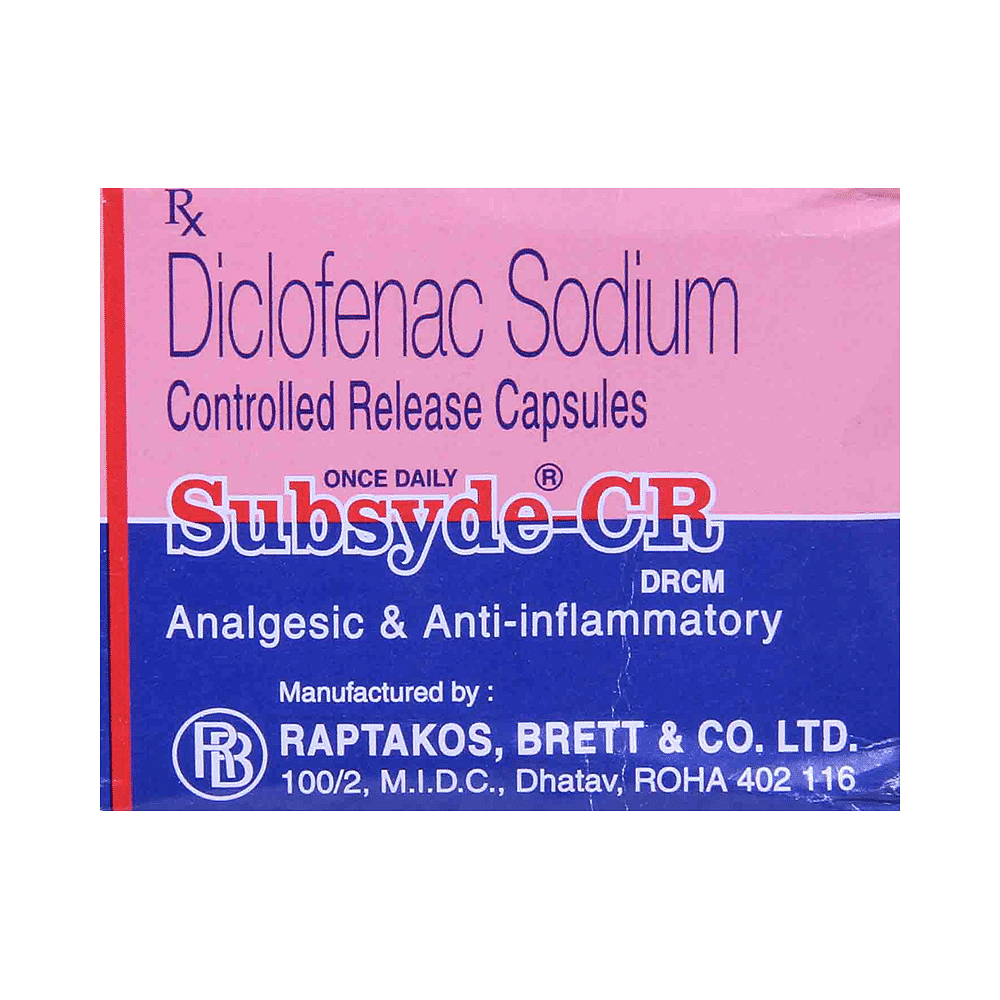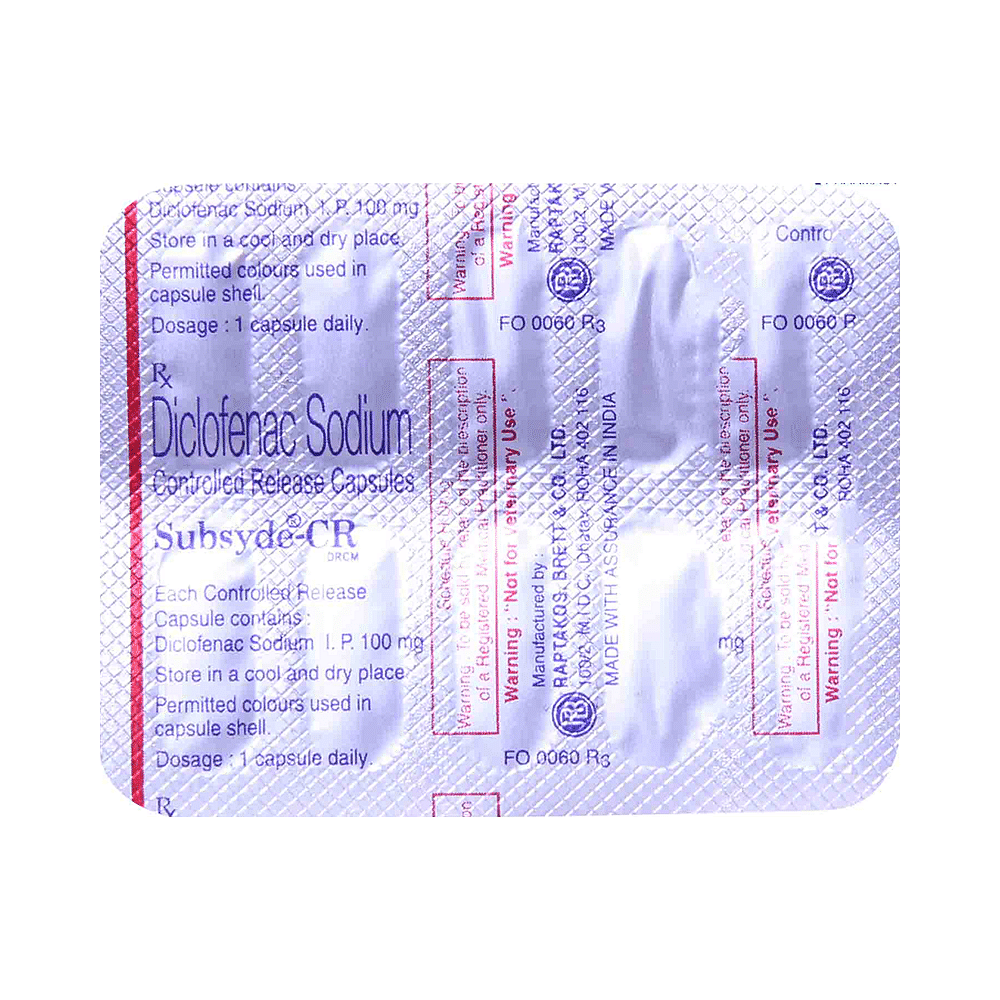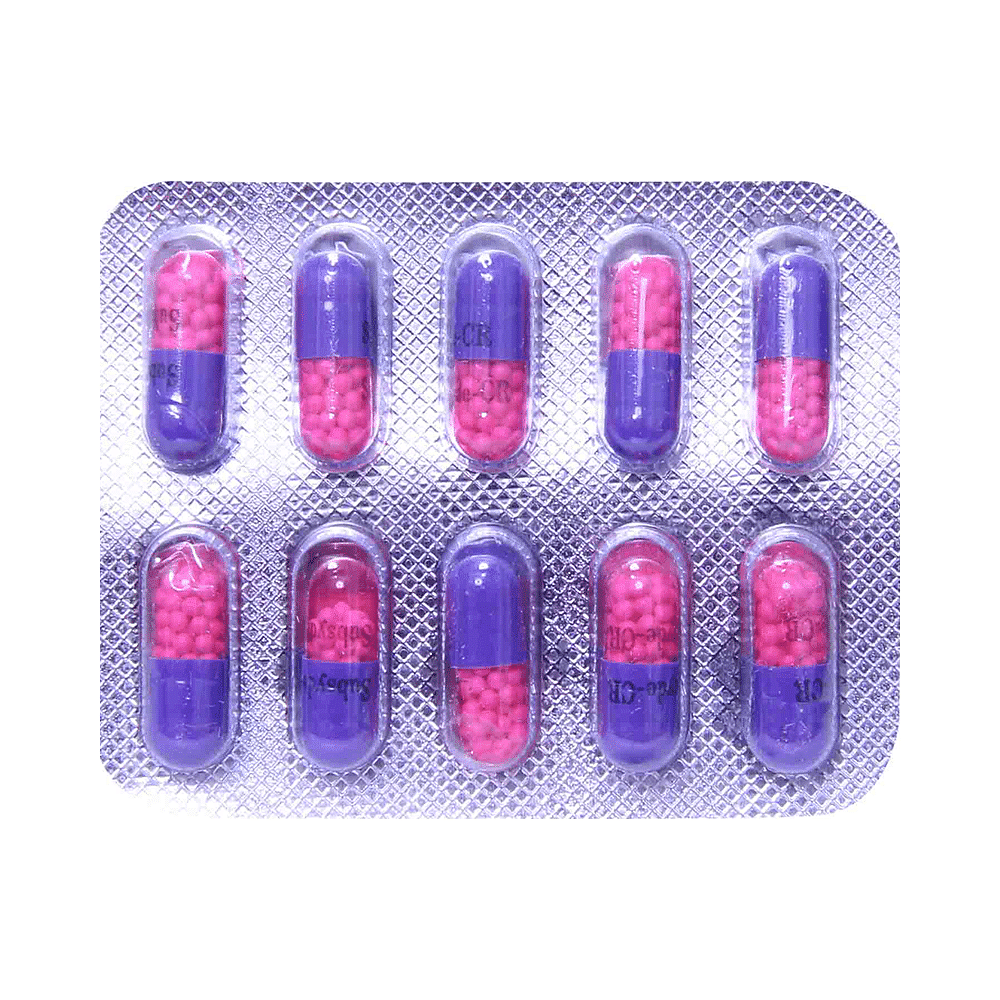



Subsyde-CR Capsule
Manufacturer
Raptakos Brett & Co Ltd
Salt Composition
Diclofenac (100mg)
Key Information
Short Description
Subsyde-CR Capsule is a pain-relieving medicine used to treat pain, swelling, stiffness, and joint pain in conditions like rheumatoid arthritis, osteoarthritis, and acute musculoskeletal injuries.
Dosage Form
Capsule CR
Introduction
Subsyde-CR Capsule is a pain-relieving medicine used to treat pain, swelling, stiffness, and joint pain in conditions like rheumatoid arthritis, osteoarthritis, and acute musculoskeletal injuries. It is commonly used in back pain, shoulder pain, neck pain, sprains, and spasms.
Directions for Use
Take this medicine in the dose and duration as advised by your doctor. Swallow it as a whole. Do not chew, crush or break it. Subsyde-CR Capsule is to be taken with food.
Safety Information
Side Effects
No common side effects listed.
Alcohol Warning
It is unsafe to consume alcohol with Subsyde-CR Capsule.
Breastfeeding Warning
Subsyde-CR Capsule is probably safe to use during breastfeeding. Limited human data suggests that the drug does not represent any significant risk to the baby.
Pregnancy Warning
Subsyde-CR Capsule is unsafe to use during pregnancy as there is definite evidence of risk to the developing baby. However, the doctor may rarely prescribe it in some life-threatening situations if the benefits are more than the potential risks. Please consult your doctor.
Interacting Medicines
Nimesulide Oxyphenbutazone Metamizole
How it works
Subsyde-CR Capsule is a non-steroidal anti-inflammatory drugs (NSAID). It works by blocking the release of certain chemical messengers that cause pain and inflammation (redness and swelling).
Quick Tips
You have been prescribed Subsyde-CR Capsule to relieve pain and inflammation. Take it with food or milk to prevent upset stomach. Take it as per the dose and duration prescribed by your doctor. Long term use may lead to serious complications such as stomach bleeding and kidney problems. It may cause dizziness, drowsiness or visual disturbances. Use caution while driving or doing anything that requires concentration. Use caution while taking Subsyde-CR Capsule as it can cause excessive drowsiness and increase your risk of stomach problems.
Frequently asked questions
Is Subsyde-CR Capsule a good painkiller?
Subsyde-CR Capsule is effective for relieving pain and inflammation. It's used for various types of pain, including sprains, strains, and other injuries. It can also help with different types of arthritis, gout, and pain or inflammation following surgery.
Is Subsyde-CR Capsule a narcotic?
No, Subsyde-CR Capsule is not a narcotic. It belongs to the non-steroidal anti-inflammatory drugs (NSAIDs) group of medicines.
Does Subsyde-CR Capsule get you high?
No, Subsyde-CR Capsule does not get you high. It does not have an abuse potential (drug-seeking behavior), and it does not cause physical or psychological dependence. However, if you don't feel well, consult your doctor.
Can Subsyde-CR Capsule damage your kidneys?
Long-term use of high doses of Subsyde-CR Capsule can increase the risk of kidney problems such as protein or blood in urine and painful urination. Patients at higher risk include those who are dehydrated, have heart failure, impaired kidney function, hypertension, elderly individuals, those on medications that increase urination (diuretics), or those whose kidney function is significantly impacted by their medication. Therefore, regular kidney function monitoring is recommended for these patients.
Does Subsyde-CR Capsule make you drowsy?
Subsyde-CR Capsule can cause drowsiness, dizziness, fatigue (tiredness), and visual disturbances. However, this is not very common and may not affect everyone. If these symptoms occur, avoid driving or operating heavy machinery.
What is the most important information I need to know about Subsyde-CR Capsule?
It's crucial to understand that Subsyde-CR Capsule may increase your risk of a heart attack or stroke. The risk is higher if you take high doses and have been using it for longer periods. Additionally, it can cause ulcers, bleeding, or holes in your stomach and intestines. These problems can occur without warning symptoms at any time during treatment and even be fatal. Therefore, if you experience any such issues, consult your doctor immediately.
Can Subsyde-CR Capsule be taken during pregnancy?
You should not take Subsyde-CR Capsule in the last three months of pregnancy because it may have harmful effects on your baby. It can also lead to premature delivery. Therefore, using Subsyde-CR Capsule is strongly advised to avoid during the first six months of pregnancy as well. In some cases, Subsyde-CR Capsule may be prescribed only if the benefits outweigh the potential risks during pregnancy. If you are unsure about its use during pregnancy, consult your doctor.


